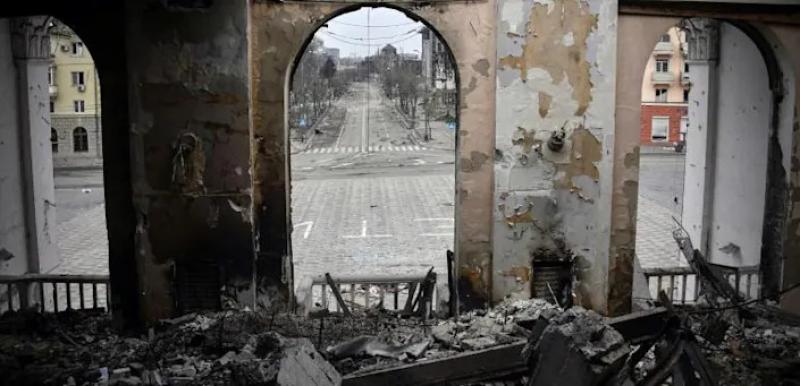Is Russia as isolated as Ukraine's allies hope?
By: Marine PENNETIER (Agence France-Presse via YahooNews)


Joe Biden appears to have made a risky bet on our behalf. NATO may be more unified than ever but the rest of the world has been reticent to climb aboard Biden's so-called democracy train.
Large portions of the world only tolerate the United States out of economic need or pragmatic weakness. As long as the money keeps flowing, the United States can be tolerated. Most of the countries the United States can easily dominate only embrace the trappings of a liberal world order to keep the money flowing and hold off the United States at a tolerable distance.
But these countries are not going to give up their national interests just because an American President is polling badly in the United States. Why would Brazil, South Africa, or India care about NATO?

Two months into Russia's invasion of Ukraine, US President Joe Biden's claim that Moscow is more isolated than ever looks more like wishful thinking.
Efforts to ostracise Moscow have faced resistance from a reluctant section of the international community.
"There's a very clear isolation of Russia from the Western bloc, especially due to the series of successive sanctions that have complicated commercial and financial exchanges," said Sylvie Matelly, deputy director at the French Institute for International Relations and Strategic Affairs.
"As for Russia's isolation on the international scene, the situation is quite different, with a number of very cautious countries that have refused to give in to Western pressure," the French researcher added.
Russia's invasion, launched on February 24 with the stated objective to "denazify" and demilitarise Ukraine, provoked immediate outrage in Europe and North America, where leaders vowed to isolate Moscow and impose "unprecedented" sanctions.
In the weeks that followed, NATO and EU airspace closed to Russian planes and the United States ordered bans on importing Russian oil and gas, as well as seafood, vodka and diamonds.
Some Russian banks were excluded from the Swift international payment system and hundreds of prominent figures were prohibited from touching down on European soil.
But outside the West, the response has been more cautious.
At the UN General Assembly on March 2, India and South Africa abstained during a vote demanding Russia's withdrawal from Ukraine.
In Latin America, Brazil and Mexico refused to participate in the barrage of sanctions.
"There are a growing number of countries that are more willing to assert their independence in spite of the fact that they aspire to closer cooperation with the West and are even in need of Western support," Chris Landsberg, a professor of international relations at the University of Johannesburg, was quoted as saying by the Washington Post.
"It's one thing to condemn the invasion of Ukraine -- it's another to launch an economic war against Russia, and many countries in South America, Africa and Asia are not ready to cross the line," the former Chilean ambassador to India and South Africa Jorge Heine added.
"They don't want to be pushed into a position that would go against their own interests, economic or otherwise."
This appears to be the case for Saudi Arabia and the UAE, which have so far avoided taking a stand against Russia. It could also be said for India, which abstained during a vote condemning the Russian invasion at the UN Security Council in February.
"For India, the war has posed a stark and unwelcome choice between the West and Russia, a choice that it has done everything possible to avoid making," explained Shivshankar Menon, former national security adviser to Indian Prime Minister Manmohan Singh.
"The United States is an essential and indispensable partner in India's modernisation, but Russia remains an important partner for geopolitical and military reasons," he wrote in an article published at the beginning of April, entitled: "The Fantasy of the Free World: Are Democracies Really United Against Russia?"
- Limited results -
For former French ambassador Michel Duclos, this tendency is nothing new — even if it takes on a whole new dimension in Ukraine.
"Already in 2015 with the Syrian crisis and the first Ukrainian crisis, we had neither India nor Brazil with us," he said. "We have to ask ourselves: why is this the case, and what can we do to build stronger bridges with these countries? The question is more relevant than ever before".
Western powers are making efforts on the ground.
UNESCO has been ramping up discussions over the past two months to relocate the meeting of the World Heritage Committee, which was set to take place in Russia in June.
But it's yielded limited results: the announcement of an indefinite postponement, so far with no guarantee to prevent Russia hosting the meeting once the invasion is over.
A similar attempt was made with the G20 grouping of major economies. The Indonesian presidency was urged to exclude Moscow from the forum, but ultimately refused to do so in the name of impartiality.
The lack of short-term effects of economic sanctions is not helping the West convince hesitant countries either.
"Yes, the sanctions are tough, but they do not deter Putin from extending his siege on Mariupol... or shelling other cities," said Judy Dempsey, an analyst at the Carnegie Europe think tank.
"If the objective was to sway Putin so he withdraws from Ukraine, it's got to be said it hasn't worked," Matelly said. "He has certainly scaled down his ambitions, but not so much in response to the sanctions as to the determination of Ukrainian forces on the ground."
It will take more time to see the full impact of the sanctions.
"The situation with the Russian economy will be clearer in June or July, because now the economy is still functioning off the back of its reserves," said Russian financial analyst Alexey Vedev of the Gaidar Institute for Economic Policy.
"The reserves are dwindling, but as long as they still exist, the sanctions are not fully felt," he added.





Maybe Putin understands that most of the world is more concerned about their own national problems than about Ukraine. Joe Biden's abstruse (and arguably phony) idealism won't keep the lights on or feed a nation's people. And in most of the world, when people are hungry in the dark they tend to overthrow their government.
We're on a path toward decades of revolts, coups, and civil wars around the world just because an American President is polling badly in the United States. Thank you, Joe Biden.
I think that's where its headed. Putin won't outlast the resistance..
"We're on a path toward decades of revolts, coups, and civil wars around the world just because an American President is polling badly in the United States."
This comment is not logical
What happens if the Russian military takes control of Russia? You think the KGB and GRU have gone away? You think the Russian military can't bring back the gulags? You actually think the Communist Party can't retake control of Russia?
You actually believe that the Russian government wouldn't be willing to kill 10 million resisters? They've done it the past.